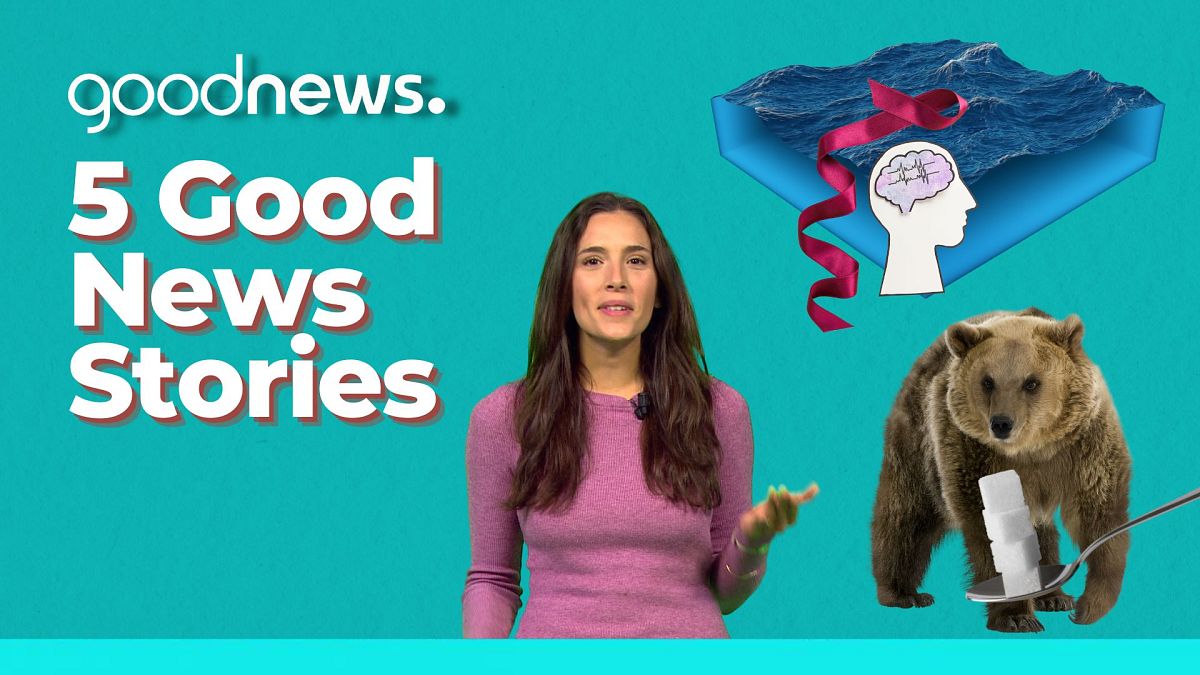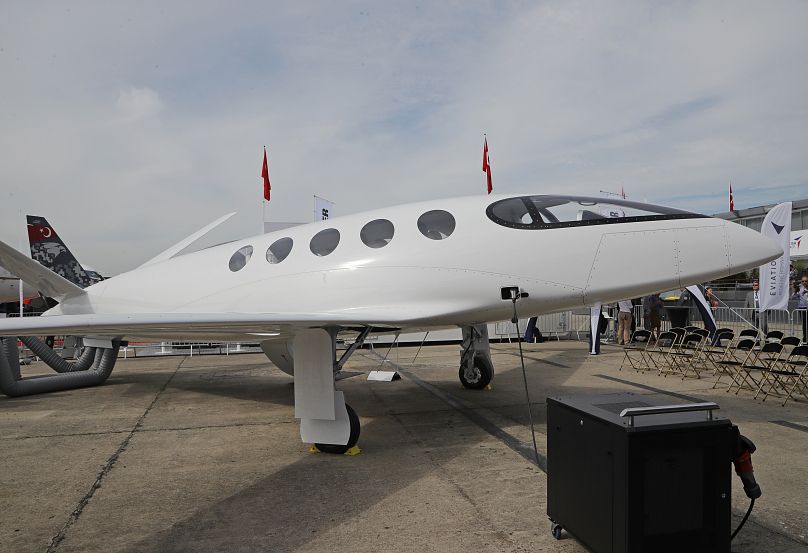Recent weeks have brought great successes, including a historic breakthrough for Alzheimer's after decades of research, an all-electric plane for passengers took a maiden voyage, and more.
Here is the good news for today: around 90 per cent of the plastic in our oceans could be gone by 2040 thanks to new technology from The Ocean Cleanup project; hibernating bears could hold a clue to better treatment of diabetes; there’s been a ‘historic moment’ in the fight against Alzheimer’s, after the success of an experimental drug; the Ecuadorian team fighting food waste, and the maiden flight of an all-electric plane.
Click the video above to get the full digest and find out more on the following:
1. Around 90 per cent of the plastic in our oceans could be gone by 2040
The pioneering technology of The Ocean Cleanup, a Dutch project developing systems to clean up the floating plastic from the oceans, could remove 90 per cent of this plastic by 2040, says the company.
The project was founded by Boyan Slate when he was just 16 years old.
The latest generation of the team’s technology, System 03, will allow them to clean the entire Great Pacific Garbage Patch, a collection of marine debris in the North Pacific that is three times the size of France and contains up to 100 million kilos of plastic waste. They have already removed more than 100,000kg.
“Our projections show that deploying ten systems based on System 03 will allow us to clean up the entire Great Pacific Garbage Patch for good – bringing us closer to completing our mission of ridding the oceans of plastic,” the team said in a statement.
The Ocean Cleanup has also developed a clever solution to the source problem of marine plastic.
A thousand rivers are responsible for roughly 80 per cent of the world's plastic pollution, so they have developed the world's first scalable river plastics collector, a transportable solar-powered and fully autonomous vessel that can collect around 50,000kg of plastic a day from the world’s most contaminating rivers before the debris has a chance to reach the ocean.
2. Hibernating bears could hold a clue to treating diabetes
Just before hibernation season, brown bears eat a lot, consuming as much as 20,000 daily calories per day, enough to put on around four kilos. And then they barely move, for months.
If we humans did the same, we would gain dangerous amounts of weight, and then we might well get diabetes.
But brown bears are clever enough to avoid that, and scientists have discovered how.
“We thought, wow, if we could figure out how bears are able to do this naturally every year with no negative consequences, then maybe that will give us some information on how to potentially develop new therapeutics for humans: let's leverage the incredible natural biology and learn about that in bears. And so that's exactly what we've done,” Professor Joanna L Kelley, one of the researchers from Washington State University, told Good News.
The study has identified eight key proteins – also found in people – that help bears control their insulin levels.
“They are known proteins, they're shared between bears and humans. I think that a really important point is these are not unique proteins to bears, which means that they're much more likely to be able to be used as therapeutics.”
Insulin is a hormone that regulates the concentration of glucose – sugar – in the blood, and it does that, for example, by sending signals to the muscles, the liver and fat cells to absorb the sugar.
The thing is, if too much sugar enters the body, our cells stop responding to our friend the insulin, and they become insulin-resistant, leading to excess sugar in our blood. This is a leading cause of Type 2 diabetes, a disease that can lead to heart attacks, strokes and blindness.
But scientists have discovered that even when brown bears gorge themselves, insulin resistance only kicks in afterwards, during hibernation, and not during the preparation, which allows them to remain diabetes-free.
“We haven't yet looked at metabolites, which may also play a very important role,” said Professor Kelley, adding that it’s more complicated than a simple on-off switch.
“It's so exciting to think about, we have this much clearer picture of active and hibernation, but those transition periods are going to tell us so much about how that process is happening.”
“We are very interested in how does this relate to humans? And the truth is that all of it relates to us, right? No matter what kind of organism we're looking at or what ecosystem or anything, we're all connected.”
This discovery, published in iScience – could hold the key to treating diabetes in humans.
The bears’ insulin-management phenomenon gives scientists a unique opportunity to better understand the disease and perhaps ultimately figure out how to slow down insulin resistance in humans.
3. There’s been a ‘historic moment’ in the fight against Alzheimer’s
An experimental drug has significantly slowed the progression of Alzheimer's in a major trial. And US regulators are already evaluating it under a special “accelerated approval” pathway.
It is the first ever medicine to bring about a sharp improvement in the treatment of the degenerative disease, which is the most common type of dementia.
The drug, called Lecanemab, reduced the pace of cognitive decline in people with early disease by 27 per cent over 18 months when compared with a placebo, meeting the main goal of the trial.
It is a major milestone for researchers who have been trying for decades to battle the severe mental decline of Alzheimer's patients.
The Alzheimer’s Association says the results of the trial are the most encouraging findings in treating the underlying causes of Alzheimer’s to date.
4. Idónea, the Ecuadorian team fighting food waste
In Quito, Ecuador, a sociogastronomic project called Idónea – led by Santiago Rosero, a gastronomy-loving journalist and cook, and Estefanía Gómez, a development specialist – aims to fight against food waste and channel unwanted food to vulnerable populations.
Idónea’s team rescues discarded vegetables and fruit from markets and farms in Quito and other cities in Ecuador, and then prepares plant-based menus. These are then offered to the general public at reasonable prices and free of charge to people in need.
Idoneá’s roots can be traced to Paris, where Rosero had once volunteered at the Freegan Pony, a non-profit restaurant that fights against food waste. He was there in his dual capacity as both journalist and cook.
"I started to build a story from the inside, but also to get interested in the big issue that shaped the whole experience, which is food waste, which was something I didn't know about. I became very interested and easily engaged with that issue. It seemed crucial to me not only for the world of gastronomy, but for the social world in general, and for the whole practice of environmental regeneration."
When Rosero returned to Ecuador in 2017 he says he was already clear on how to set up a project based on those principles. By that time, he had been told about a fellow Ecuadorian who was studying in the Netherlands, Estefanía Gómez, who was also studying development issues.
“She quickly became my partner in the creation of the project, and by the end of 2018 the project was put together."
The locations of Idónea change regularly; sometimes they set up in friends' restaurants or in unconventional places such as churches or schools, where they organise events that combine gastronomy and training.
“Thirty per cent or one third of all the food that is produced in the world is wasted every day. If three apples are produced, one ends up wasted, and that 30 per cent equals 1.3 billion tons of food,” explained Rosero, as an example of what they teach in the courses.
“This thing that we're doing is fairly easy to replicate. It's a matter of will and determination, commitment; and that commitment is not too difficult to acquire once you understand the problem.”
The gathering of ingredients, cooking, serving and cleaning tasks are possible thanks to a team of volunteers, while the gastronomic vision is left to the chefs of the host restaurants, who contribute with their styles and concepts.
One of the fundamental principles is that the project “…is not far-fetched,” says Rosero. “If we're rescuing food and there are people who are short on food, we're going to share the food with them. Basic, isn't it? Then we invite them to take what is fresh, so that they can cook it at home.”
Idónea is now also preparing to scale up the project, “We are applying for new funds that have to do with addressing the drastic problem of chronic child malnutrition. We're trying to put together a multidisciplinary project that involves nutritionists, people making portable and accessible water systems in remote communities and also building systems that can help to achieve these things,’’ says Rosero.
5. The maiden flight of an all-electric plane.
Alice, an all-electric aircraft, just carried out her maiden flight in the United States.
After years of on-the-ground development, US company Eviation was able to keep the plane in the air for eight minutes, before landing it safely.
"It was a wonderful experience for everyone who was here. We were able to witness history in the making,” said Gregory Davis, Eviation’s CEO.
“The flight lasted for eight minutes. We flew 3,500 feet in altitude and we were able to complete our test plan exactly as we intended to."
The Arlington-based company is aiming to deliver passenger and cargo electric planes by 2027.
It says the promise will depend on the advancement of battery technology, but the company already has orders for their planes from regional airlines.
Eviation is on a growing list of companies that have joined the challenge to change the way we fly: making aviation more efficient, sustainable and less expensive thanks to greener propulsion technologies.
If you found value in this episode of the good news roundup share it with your friends.
And remember, it can be hard to find among the headlines, but some news, can be, good new.



